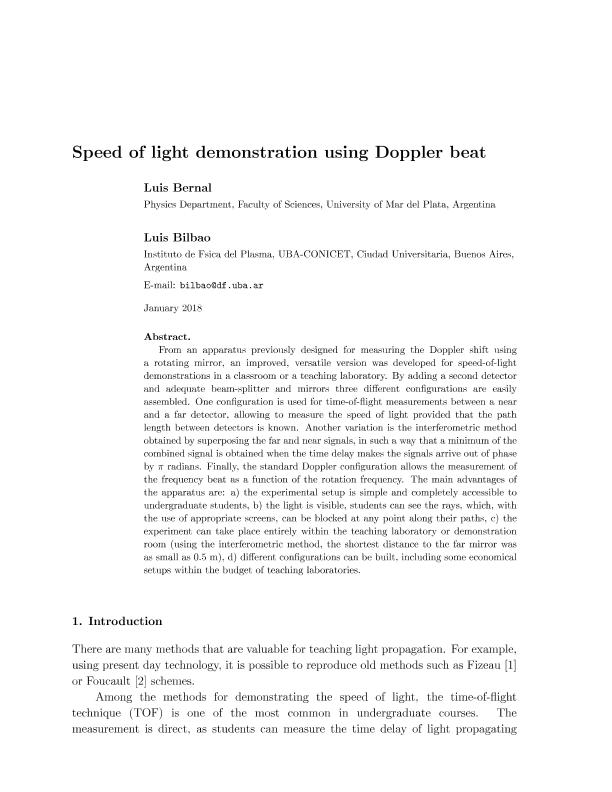Mostrar el registro sencillo del ítem
dc.contributor.author
Bernal, Luis

dc.contributor.author
Bilbao, Luis Ernesto

dc.date.available
2019-10-22T15:42:02Z
dc.date.issued
2018-04
dc.identifier.citation
Bernal, Luis; Bilbao, Luis Ernesto; Speed of light demonstration using Doppler beat; IOP Publishing; European Journal of Physics; 39; 3; 4-2018; 1-14
dc.identifier.issn
0143-0807
dc.identifier.uri
http://hdl.handle.net/11336/86856
dc.description.abstract
From an apparatus previously designed for measuring the Doppler shift using a rotating mirror, an improved, versatile version was developed for speed of light demonstrations in a classroom or a teaching laboratory. By adding a second detector and adequate beam-splitter and mirrors, three different configurations are easily assembled. One configuration is used for time-of-flight measurements between a near and a far detector, allowing one to measure the speed of light provided that the path length between detectors is known. Another variation is the interferometric method obtained by superposing the far and near signals in such a way that a minimum of the combined signal is obtained when the time delay makes the signals arrive out of phase by π radians. Finally, the standard Doppler configuration allows the measurement of the frequency beat as a function of the rotation frequency. The main advantages of the apparatus are (a) the experimental setup is simple and completely accessible to undergraduate students, (b) the light is visible, students can see the rays, which, with the use of appropriate screens, can be blocked at any point along their paths, (c) the experiment can take place entirely within the teaching laboratory or demonstration room (using the interferometric method, the shortest distance to the far mirror was as small as 0.5 m), and (d) different configurations can be built, including some economical setups within the budget of teaching laboratories.
dc.format
application/pdf
dc.language.iso
eng
dc.publisher
IOP Publishing

dc.rights
info:eu-repo/semantics/openAccess
dc.rights.uri
https://creativecommons.org/licenses/by-nc-sa/2.5/ar/
dc.subject
DOPPLER
dc.subject
EXPERIMENT
dc.subject
OPTICS
dc.subject
SPEED OF LIGHT
dc.subject.classification
Óptica

dc.subject.classification
Ciencias Físicas

dc.subject.classification
CIENCIAS NATURALES Y EXACTAS

dc.title
Speed of light demonstration using Doppler beat
dc.type
info:eu-repo/semantics/article
dc.type
info:ar-repo/semantics/artículo
dc.type
info:eu-repo/semantics/publishedVersion
dc.date.updated
2019-10-21T19:16:32Z
dc.journal.volume
39
dc.journal.number
3
dc.journal.pagination
1-14
dc.journal.pais
Reino Unido

dc.journal.ciudad
Londres
dc.description.fil
Fil: Bernal, Luis. Universidad Nacional de Mar del Plata. Facultad de Ciencias Exactas y Naturales. Departamento de Física; Argentina. Consejo Nacional de Investigaciones Científicas y Técnicas; Argentina
dc.description.fil
Fil: Bilbao, Luis Ernesto. Consejo Nacional de Investigaciones Científicas y Técnicas. Oficina de Coordinación Administrativa Ciudad Universitaria. Instituto de Física del Plasma. Universidad de Buenos Aires. Facultad de Ciencias Exactas y Naturales. Instituto de Física del Plasma; Argentina
dc.journal.title
European Journal of Physics

dc.relation.alternativeid
info:eu-repo/semantics/altIdentifier/doi/http://dx.doi.org/10.1088/1361-6404/aaad4e
Archivos asociados
